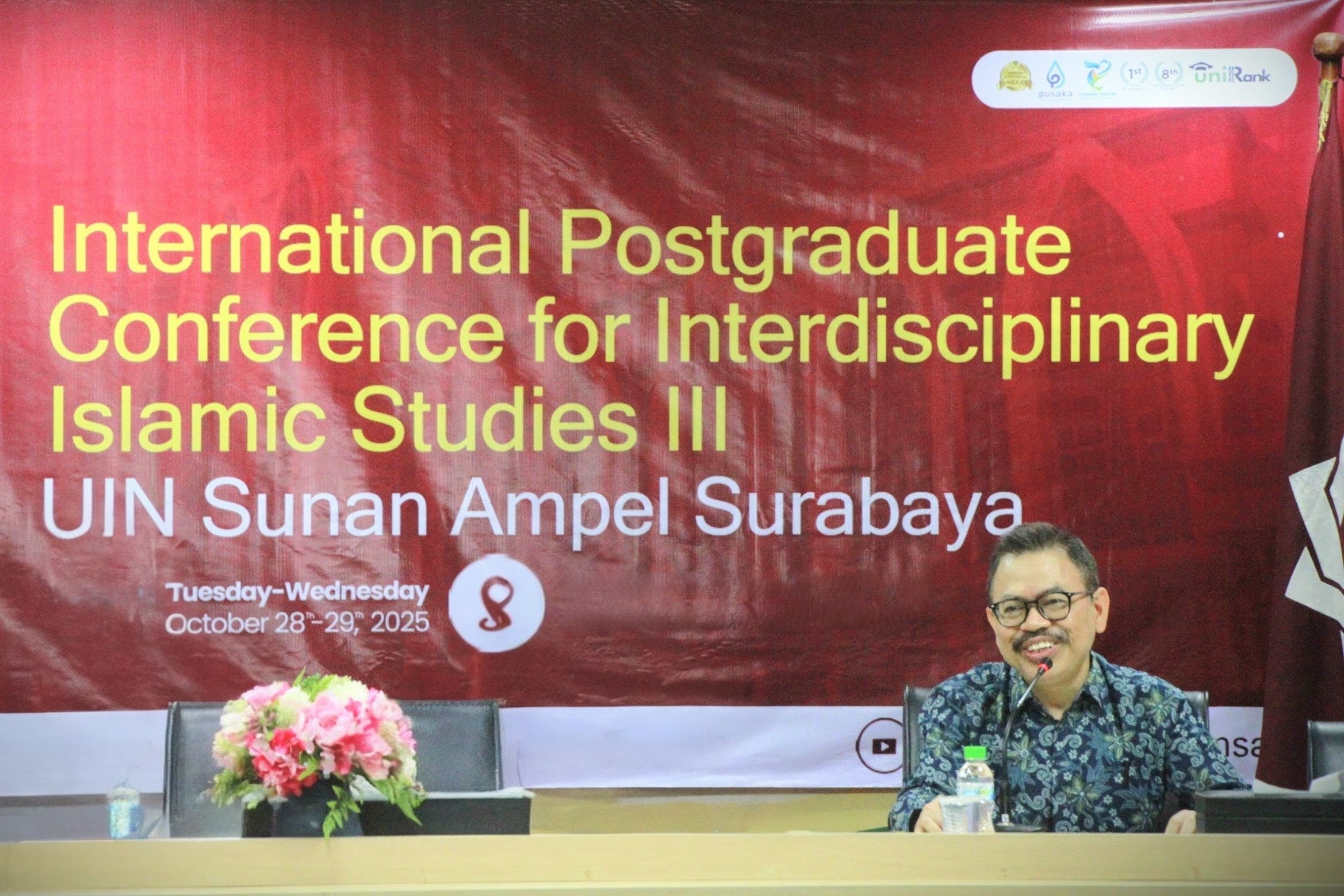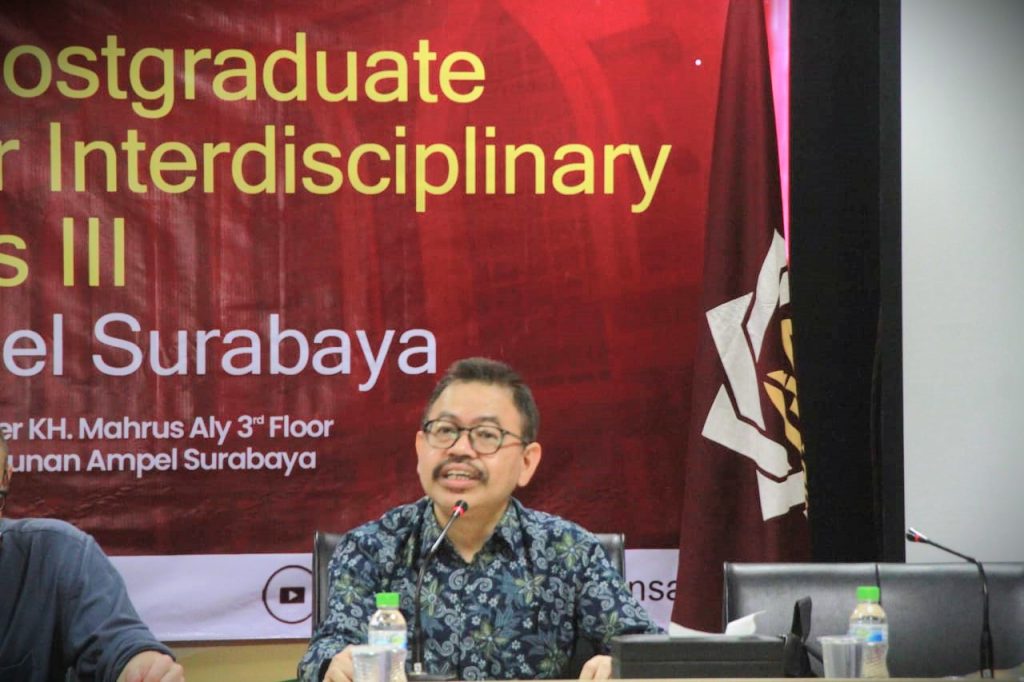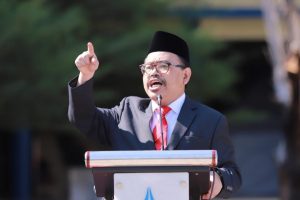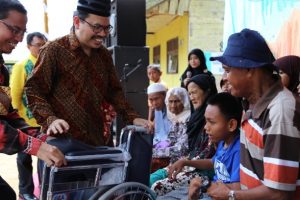
The Struggle for Justice 2025, Local, National, and Global Citizenship
Mujiburrahman2
[1] This essay is presented at the International Postgraduate Conference for Interdisciplinary Islamic Studies III, organized by the Postgraduate Program of UIN Sunan Ampel, Surabaya on 28-29 October 2025.
As human beings, we are at once the same and different. Our sameness allows us to understand one another. Our differences give us identity—so that we can recognize each other, feel mutual attraction, and realize our own uniqueness. To be “the same” means to be one; to be “different” means to be many. The one gathers the many, and the many give the one its colors.
The relationship between the one and the many, the same and the different, the universal and the particular—especially in human life—is not easy to define, and even harder to practice in real life. In daily realities, people sometimes overemphasize sameness and unity while suppressing differences and individuality, even denying their existence. At other times, differences and uniqueness are exaggerated, hardened, and lead to bloody conflict—while sameness and unity fade away, disappearing almost without a trace.
As human beings, we are the same. Those who believe in God accept that all humans are created by the same God. We live on the same planet Earth. Our bodies need the same nutrients. Our organs serve the same functions. Humans use language—spoken, written, or gestured symbols—to communicate. We use our reason and senses to gain knowledge. We live in societies. We love beauty and thus create art. Humans are neither angels nor devils; each person carries within them the potential for good and evil.
On the other hand, every human being is unique. There are male and female humans. No two humans, not even identical twins, are ever completely the same. Physical differences exist, and even more so, differences in mind and personality. Humans may live on the same Earth, but its regions differ in climate, soil, and water, which in turn shape people’s thoughts, feelings, attitudes, and behaviors. Different geographical conditions give rise to cultural variations in language, knowledge, art, livelihoods, and tools of daily life. These differences also form distinct social groups—ethnicities, religions, nations, and states. In short, human social life differs greatly in its cultural, economic, and political dimensions.
Yet, difference does not automatically mean opposition, conflict, or hostility. Differences may give birth to cooperation, because each party recognizes its need for and complementarity with others. This, indeed, is the meaning of the word “masyarakat” in the Indonesian language, derived from the Arabic mushârakah, meaning to share, to partner, to participate. Every individual needs others. Likewise, every community needs other communities. This is the ideal image of society—a fellowship that supports and nurtures one another. By “society” here, we mean any community, from the smallest family to a nation or even all citizens of the world.
Unfortunately, reality does not always work that way. In societies, some people benefit while others are harmed. Some wield power and wealth, while others live in poverty. Some attain the highest education, while others remain illiterate, deprived of formal learning. Expanding our view, we find disparities not only among individuals but also among communities and nations—economic, political, and cultural inequalities. Some are strong, others are weak. Some dominate—even exercise hegemony—while others can only accept and surrender. Some produce, others merely consume. Some decide, while others must obey decisions without protest. In short, injustice arises: humans oppress their fellow humans.
Therefore, the enduring question throughout human history is: How can we manage our differences peacefully and justly? Before we answer this question, we must first ask: what do we mean by justice, and what are the causes of injustice in our societies?
(2)
It is not easy to define justice in a way everyone agrees upon. Some say justice is balance. Others say justice means placing things where they belong. Still others define it as giving each person his/her due rights and imposing upon each his/her proper duties. Perhaps all these definitions hold true, depending on the case.
Yet perhaps another way to think of justice in communal life is as the discovery of common ground amidst difference. Once this common ground is agreed upon, the duty of individuals, groups, and nations is to realize and uphold the shared values within it. A well-known example is the Golden Rule: Do unto others as you would have them do unto you. This principle can serve as common ground for all humanity, though its practical application can be complex. For instance, we may all agree that students should not smoke, but can a teacher strike a student caught smoking as a form of discipline? Some say yes—it’s normal in education; others call it a crime. Nevertheless, such issues may be settled by another consensus, through rules and laws.
Another example of common ground is the Universal Declaration of Human Rights (UDHR) set by the United Nations. Its principles should serve as a shared foundation for upholding global justice. Yet in practice, it has not. Some reject it because freedom of expression is taken to include the right to insult what is sacred to religion. Others reject it because the UN system itself is unjust—some nations hold veto power, so even grave human rights violations, like Israel’s genocide in Gaza, cannot be stopped because the U.S. vetoes UN resolutions. If human rights were applied impartially—without double standards—perhaps all nations could accept them as a genuine reference for global justice.
Among Muslims, efforts have also been made to articulate such a shared ground. One prominent concept in recent decades is maqāṣid al-sharī‘ah, the objectives of Islamic law, which al-Ghazālī described as fundamental benefits recognized by all faiths. These include the preservation of religion, life, intellect, wealth, and lineage. Indonesian scholar Ali Yafie added a sixth—environmental preservation. Thus, any act, policy, or law is just if it safeguards these six essentials. Beyond these lie complementary needs—what Islamic jurisprudence calls maṣlahah taḥsīniyyah (enhancing well-being) and maṣlahah takmīliyyah (supportive benefits)—which may differ in different societies, places, and times.
For Indonesians—regardless of religion or ethnicity—our agreed common ground is Pancasila and the 1945 Constitution, as amended during the Reformasi period. These are our collective reference points for defining justice in Indonesia. All laws and regulations must align with them. When society deems a law unjust or contrary to Pancasila and the Constitution, it can be challenged in the Constitutional Court—whose verdict ultimately depends on its judges. In other words, justice in law depends greatly on who holds the power to define and decide.
(3)
Then, what are the causes of injustice in our societies? At least two vices make humans unjust: arrogance and greed. Arrogance arises when one looks down on others—feeling superior in intellect, wealth, power, beauty, or strength. Over time, this sense of superiority extends beyond individuals to families, races, and nations. Nobles see themselves above commoners; religious elites above the laity; white people above people of color. Thus arise racism, feudalism, and colonialism—where the privileged dominate and oppress the weak.
The second vice is greed—the boundless desire to own and control. The greedy crave more and more, regardless of others’ suffering. Greed drives kings to exploit their people, colonizers to enslave nations, employers to abuse workers—even families to destroy one another. It breeds corruption so extreme that development becomes mere false promises. It fuels corporations that support genocide in Gaza to test weapons and military technologies (Albanese 2025). In the modern market economy, greed is glorified—stimulated by advertising and consumption metrics. A person is seen as prosperous if they consume more. Doesn’t that mean the greedier one is, the “better off” they seem? Yet, greed inevitably breeds injustice—human exploitation by humans.
When arrogance and greed unite, domination and hegemony emerge—the strong over the weak: landowners over farmers, factory owners over laborers, the educated over the uneducated. Society becomes hierarchical. Power is held by those at the top—often in the name of the people. Democracy’s slogan “of the people, by the people, for the people” rings hollow, for in reality, the powerful among the people rule. Though everyone votes equally, wealth shapes candidacy and outcomes. Thus, democracy devolves into oligarchy—a collaboration of the rich, politicians, and bureaucrats, as Vedi R. Hadiz (2013) notes.
The same applies globally. Rich, advanced nations—armed with capital, science, and technology—control world economics and politics. They exploit the natural wealth of developing countries, taking far greater profit than the rightful owners. They dominate trade, and even threaten other countries by military force when needed. In some cases, they wage wars that kill hundreds of thousands. In this digital age, with advanced information technology, their control grows stronger. Citizens of poorer nations become mere consumers of their technologies—including social media, which harvests our personal data for free.
This dependence is a form of digital imperialism. We are made addicted and dependent on social media. Our psychological needs—such as the desire for praise—are manipulated. Likes and reactions become triggers that keep us endlessly engaged, fearful of missing out. Gradually, we tie our self-worth to online approval. This dependency becomes existential, as F. Budi Hardiman (2021) puts it: “I click, therefore I am.” As if, without recognition by others on social media, our lives become meaningless.
Now, we see another advanced technology—Artificial Intelligence (AI)—which assists human thought and provides information. We can ask it to write a paper, and it will instantly respond. Sometimes it is accurate, sometimes it is not. For the lazy, it may become a trap of mass ignorance—another face of digital imperialism. In an interview with me, a Malay leading scholar, Farish A. Noor, recalls Syed Hussein Alatas’s book entitled The Myth of the Lazy Native (1977), where he notes that colonialists once branded indigenous peoples as lazy to justify replacing them with others—Europeans, Chinese, and Indians. Today, a similar narrative labels youth as lazy or fragile, the “strawberry generation.” Farish Noor suspects this discourse may be deliberately spread to justify replacing humans with AI itself.
(4)
Perhaps because humans are simultaneously the same and different, every attempt to emphasize one side provokes the other. When uniformity is imposed, diversity rises in resistance. When difference dominates, unity seeks restoration. When one side prevails too strongly, justice falters. True justice requires balance.
One thing that is truly felt in this digital age is globalization. Previously, globalization might not have been truly felt. Direct international relations were only experienced by a few people. For a villager like me, if I didn’t get a scholarship, I wouldn’t have been able to study abroad. For most of my family in the village, going abroad is only experienced when going on the Hajj or Umrah. Alvin Toffler stated in the 1980s that globalization is felt in food, fun, and fashion. Perhaps we do experience these three things, especially in the cities. We eat pizza, Dunkin’ Donuts, wear blue jeans or Arab robes, and watch Hollywood, Bollywood, and Hong Kong films. However, when we live with the internet, cell phones, and social media, globalization is so close, just at the touch of our fingers. Anything from the outside, the international world, we can access it directly via our cell phones.
So, is our world becoming increasingly uniform? Many people say so. Airports, malls, hotels, cars, trains, toll roads, food, and drink—look similar everywhere. Yet, we still find unique things, unique features that aren’t found everywhere. Tourism wouldn’t be successful if it didn’t offer something unique. Communities in various places not only accept ideas and goods from abroad but also try to preserve and develop ideas and goods originating from local cultures. In fact, no matter how great the power of globalization, some local elements will persist. Therefore, as Roland Robertson said, globalization is ultimately glocalization, a fusion of the global and the local (Featherstone 2020).
A similar thing happened in our homeland, Indonesia. During the Soeharto period (1967-1998), the government worked hard to maintain unity, resulting in a highly centralized government. At that time, Mangunwijaya even said that Jakarta was not much different from Batavia during the colonial period, which was the center of everything, exploiting everything outside itself (Mujiburrahman 2001). Seno Gumira Ajidarma (2015) also once wrote, inviting people to think, what would Jakarta be like if it were alone without other parts of Indonesia? However, after the Reformation, demands arose that Jakarta no longer be the center of everything. Initially, some demanded that Indonesia be a federal state. The middle path ultimately chosen was regional autonomy, centralized at the district/city level. This regional autonomy, with all its advantages and disadvantages, ultimately encouraged the revival of local cultures that had been marginalized.
In religious circles, this global-local discourse has long been ongoing, particularly concerning the interpretation of religious teachings and how to practice them in local contexts. In this sense, glocalization has already developed in the religious realm. Hendrik Kraemer (1947), a Protestant Christian figure, suggested that Christian missions would be more successful if missionaries established ethnically based churches. This idea has proven successful with the establishment of the Javanese Christian Church, the Kalimantan Evangelical Church, the Maluku Protestant Church, and others. Likewise, Catholics developed a theology of inculturation (Martasudjita 2021) and Abdurrahman Wahid championed “Indigenization of Islam”—adapting religious practices to local culture without compromising religious principles (Mujiburrahman 2023).
Still, despite such glocalization, the world remains unjust toward the weak. Can humanity truly achieve cooperation among the differences—the local and the global, the particular and the universal? If justice means giving everyone their due rights and duties, has that balance been achieved at personal, societal, national, and global levels? We all know the answer is not yet, though not absolutely no. The struggle for justice continues. We may never see perfect justice on earth, perhaps only in the hereafter. Nevertheless, the universe itself constantly seeks balance (equilibrium). Therefore, the real question is not how successful justice has been—but which side we stand on: Are we among the oppressors and betrayers of justice—or among its defenders and fighters? Wallāhu a‘lam — God knows best.




